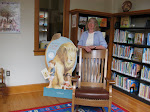There are days when words fail me. Usually they occur when I hear
someone say something that feels so amazingly wrong to me, I can’t believe
anyone could ever think that. Some part of me knows there are all sorts of
logical, thoughtful, calm things that could be said. But, I’m so busy fighting the desire to use
violent force, I can’t think. I can’t find a cohesive argument, because the only
thing going through my head is “Don’t hit them, don’t hit them!”
I had one of these conversations with Bruce the other day. I was talking about a poet I know who does a “Poet in the Schools” program. She spends a week at schools throughout Central NY doing poetry workshops.
“What if the kids don’t want to do poetry?” Bruce said to me.
I resisted hitting him, despite the fact that he would never dream of saying “what if they don’t want to learn biology?” He still clings to the vestiges of early Quakerism that held fiction and poetry were “unreal” and therefore to be avoided.
That evening I was reading Jeanette Winterson’s memoir Why be Happy when You can be Normal?, and found that some people can manage articulate, intelligent, and most important, peaceful answers to such comments. Why be Happy is Winterson’s memoir of her rather grim childhood. Adopted by a Pentecostal family, she grew up in poverty dealing with abuse from her adoptive mother. She left home at sixteen, kicked out by her mother because Winterson was gay.
Poetry and literature helped Winterson survive. Discovering T.S. Eliot set her on her own journey as a writer. She writes:
"I
had no one to help me, but the T. S. Eliot helped me.
So when people say that poetry
is a luxury, or an option, or for the educated middle classes, or that it shouldn’t
be read at school because it is irrelevant, or any of the strange and stupid
things that are said about poetry and its place in our lives, I suspect that
the people doing the saying have had things pretty easy. A tough life needs a
tough language – and that is what poetry is. That is what literature offers – a
language powerful enough to say how it is.
It
isn’t a hiding place. It is a finding place."
“A tough life needs a tough language – and that is what poetry is.” Reading that, I realized that when people say that poetry is unnecessary or unreal, they are thinking of poetry as flowery and sweet; missing the toughness of it. Poetry comes with sharp edges, cutting truths that crack us open. If you think it’s soft and flowery, maybe you aren’t reading the tough stuff. Or maybe like Winterson says, you haven’t had a tough life.
But what about all the kids that do? Have tough lives that is. If we reduce education to facts and figures, to whether a kid knows how to look up how thunderstorms occur and present a powerpoint presentation on it, or write a five paragraph essay on the life cycle of a snail, have we failed to acknowledge that living requires more than information? Have we failed children with tough lives, who need the raw language of poetry, a cutting metaphor for life, in order to crack things open and find themselves? Have we failed to provide a “language powerful enough to say how it is?”
“A tough life needs a tough language – and that is what poetry is.” It needs to be emblazoned on our schools and in our minds. If it weren’t so long and I wasn’t such a wimp, I’d have it tattooed on my arm. Like a good poem, it pulls me up sharp.
I haven’t always thought of poetry as a tough language. I think of swearing and yelling as tough. But the truth is – that truth is found in the subtle, sharp metaphor that arrows into my heart and soul and resonates with something deep in my core. Facts and figures don’t do that. Poetry, literature, a pointed metaphor, a character like me and yet not – those things help me find myself. And isn’t that, at least, part of what education is?
Yeah, we need facts and information – but we need to know who we are, what motivates us, and how to live in the world we are in, with the facts and figures we’ve learned.
I promise to keep working at not hitting the people who say poetry, fiction, and fantasy aren’t necessary or important. But I expect all those people to start listening to the “tough language” of poetry. Their lives depend on it.

